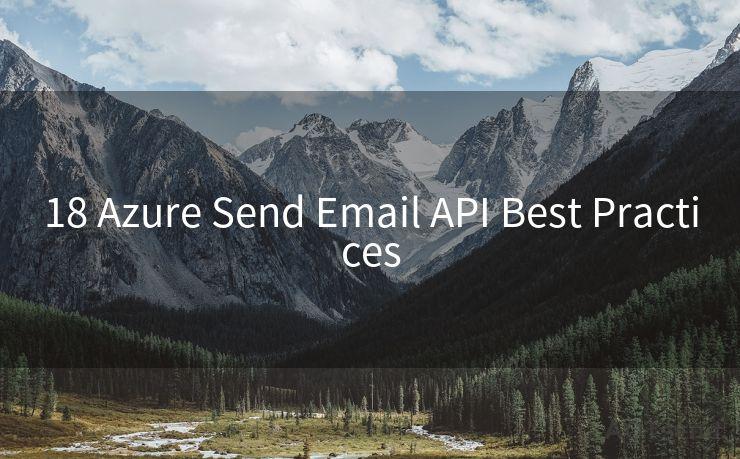18 Azure Send Email API Best Practices




When it comes to sending emails through the Azure Send Email API, following best practices is crucial for ensuring reliable and effective communication. In this article, we'll explore 18 essential best practices that will help you make the most of Azure's email capabilities.
1. Authenticate Your Account Securely
Before you can send emails through the Azure Send Email API, you need to authenticate your account securely. Use Azure Active Directory (Azure AD) authentication for enhanced security and ease of management.
2. Understand the Limits and Quotas
Familiarize yourself with the sending limits and quotas associated with the Azure Send Email API. This helps you plan your email campaigns effectively and avoid any potential issues.
3. Use Verified Domains
Ensure that you are sending emails from a verified domain. This adds credibility to your emails and reduces the chances of them being marked as spam.
4. Maintain a Clean and Updated Email List
Regularly update and clean your email list to remove inactive or bounced email addresses. This improves the deliverability of your emails and reduces the risk of being blacklisted.
5. Follow CAN-SPAM Compliance
Adhere to the CAN-SPAM Act requirements, such as including a clear and conspicuous unsubscribe option in all your emails.
6. Optimize Email Content
Craft your email content carefully, ensuring it is relevant, engaging, and mobile-friendly. Use a clear call to action to encourage recipient interaction.
7. Test Email Deliverability
Regularly test your email deliverability to ensure that your messages are reaching your intended recipients. Use tools like Mail Tester or SendForensics to check for potential issues.
8. Monitor and Analyze Performance
Utilize Azure's monitoring and analytics tools to track the performance of your email campaigns. This data can help you fine-tune your strategy for better results.
9. Handle Bounces and Complaints Appropriately
Set up automated processes to handle email bounces and complaints. This helps maintain a healthy email list and improves your sender reputation.
10. Use Dedicated IPs (If Necessary)
Consider using dedicated IPs for sending emails if you have a high volume of outbound messages. This can improve deliverability and provide more control over your sending reputation.
11. Implement DKIM and SPF
Enhance the security of your emails by implementing DomainKeys Identified Mail (DKIM) and Sender Policy Framework (SPF). These technologies help verify the authenticity of your emails.
12. Avoid Spam Trigger Words
Be cautious of using spam trigger words in your email subject lines or body content. These words can increase the chances of your emails being flagged as spam.
13. Send at Optimal Times
🔔🔔🔔
【AOTsend Email API】:AOTsend is a Managed Email Service for sending transactional emails. Support Email Types: reminders, authentication, confirmations, notifications, verification codes, invoices, password resets, account activations, billing statements, two-factor authentication (2FA), and one-time passwords (OTP) emails, etc. $0.28 per 1000 Emails. 99% Delivery, 98% Inbox Rate.
You might be interested in:
Why did we start the AOTsend project, Brand Story?
What is a Managed Email API, How it Works?
Best 25+ Email Marketing Platforms (Authority,Keywords&Traffic Comparison)
Best 24+ Email Marketing Service (Price, Pros&Cons Comparison)
Email APIs vs SMTP: How they Works, Any Difference?

Analyze your audience's behavior and preferences to determine the optimal time for sending emails. This can increase open and click-through rates.
14. Segment Your Email Lists
Segment your email lists based on demographics, interests, or purchase history. Tailored emails are more likely to engage recipients and drive conversions.
15. Utilize A/B Testing
Conduct A/B testing to determine the most effective subject lines, content, and call-to-action buttons for your emails.
16. Monitor Blacklists
Regularly check if your sending domain or IP address has been blacklisted. Prompt action can help you resolve any issues and maintain a good sending reputation.
17. Use Double Opt-In for Subscriptions
Implement a double opt-in process for email subscriptions. This ensures that only interested and engaged recipients are added to your email list.
18. Stay Updated on Best Practices
Email marketing and deliverability best practices are constantly evolving. Stay updated by following industry blogs, newsletters, and participating in relevant communities.
By adhering to these 18 Azure Send Email API best practices, you can significantly improve the effectiveness of your email communications, enhance your sender reputation, and achieve better results from your email campaigns.




Scan the QR code to access on your mobile device.
Copyright notice: This article is published by AotSend. Reproduction requires attribution.
Article Link:https://www.mailwot.com/p5663.html



